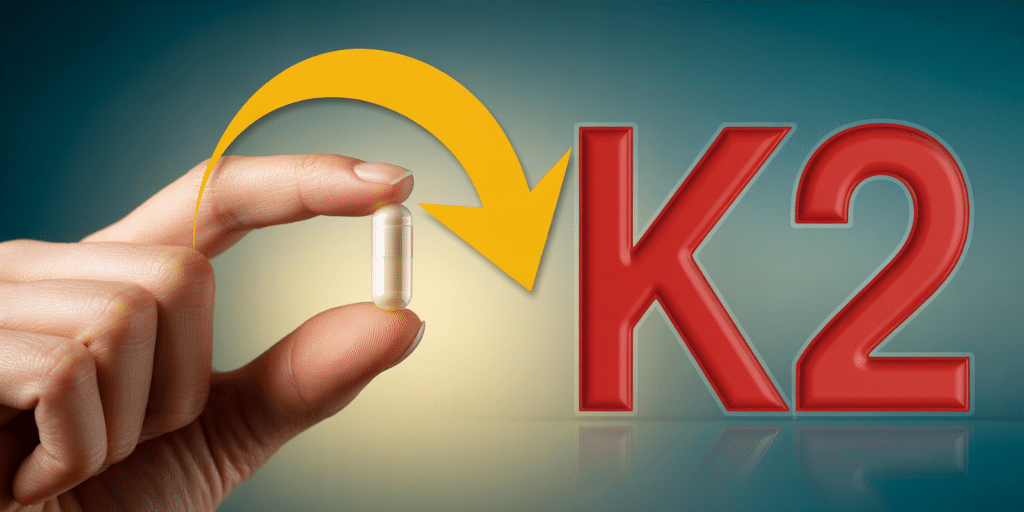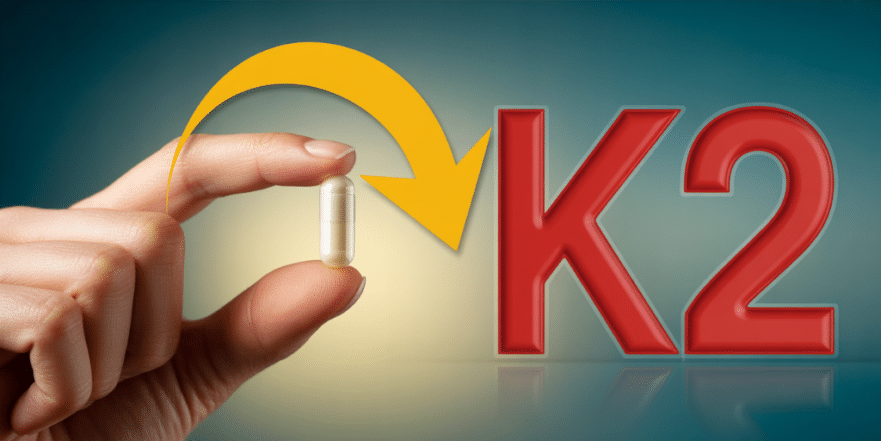
Many people take a combined Vitamin K2 and D3 supplement, believing it will clear plaque and calcium from their arteries. However, this common practice might not be as effective or safe as people think. While both vitamins are important, taking them together in a single pill can lead to issues with dosage and potential risks. (This article is based on the knowledge and personal experience of Dr. Ford Brewer)
Understanding Vitamin K2

Vitamin K2 is an organic compound found in animal-based foods like beef liver, cheese, and egg yolks, as well as fermented foods such as natto and sauerkraut. It exists in different forms, with MK4 and MK7 being the most common. While it’s often said that K2 pulls calcium from arteries and puts it into bones, the reality is a bit more nuanced. K2 influences key proteins like Matrix Gla Protein (MGP), which helps reduce arterial calcification, and Osteocalcin, which aids in directing calcium to bones. Studies suggest K2 can be very helpful for osteoporosis, especially at high doses (45 milligrams). However, evidence doesn’t definitively show it reduces existing calcium in coronary arteries, though it can slow down the progression of calcification.
Despite not directly removing plaque, K2 supplementation has shown positive effects on metabolic health, particularly in managing prediabetes, diabetes, and insulin resistance. These conditions are major, often overlooked, causes of heart attacks and strokes. By improving insulin sensitivity, K2 may indirectly contribute to cardiovascular health.
Regarding side effects, K2 is generally considered safe. Reported issues like dizziness or shortness of breath are rare and mild. Concerns about bleeding or clotting are usually linked to Vitamin K1, which is crucial for blood clotting, not K2. For general health and improving insulin resistance, a daily dose of 400 micrograms or more of K2 is often recommended. For osteoporosis, higher doses of up to 45 milligrams might be used.
The Role of Vitamin D3

Vitamin D3, also known as cholecalciferol, acts much like a hormone and is stored in fatty tissues. A significant portion of the global population is deficient in Vitamin D. While once overlooked, its importance has become clearer, especially in relation to conditions like diabetes and even COVID-19. Low Vitamin D levels have long been associated with increased cardiovascular risk and a higher chance of fractures.
Supplementing with both D3 and K2 together has shown benefits for bone health, diabetes management, and reducing cardiovascular risk. For Vitamin D3, it’s best to measure your levels first. Optimal levels for cardiovascular health are typically between 50 to 90 nanograms per milliliter. A daily supplement of 5,000 international units (IU) of D3 is often sufficient and safe for many people.
Why Not Take Them Together?
The main issue with combined K2 and D3 pills lies in their differing safety profiles and optimal dosages. Very high levels of Vitamin D3 can increase calcium in the blood and potentially harm the kidneys. While some argue that any level of D3 is fine or that problems are linked to magnesium deficiency, the scientific evidence suggests caution with high D3 doses.
Many combination pills contain a standard dose of D3 (like 5,000 IU) but a much lower dose of K2 (e.g., 90 micrograms) than what’s recommended for significant benefits. If you try to increase your K2 intake by taking multiple combined pills, you might end up with excessively high D3 levels (e.g., 20,000 IU daily), which is generally not advised for long-term use. This is why taking K2 and D3 separately is recommended, allowing for independent control over each vitamin’s dosage.
Key Takeaways
- Vitamin K2’s Role: K2 supports bone health and may improve insulin resistance, indirectly benefiting cardiovascular health by addressing metabolic issues. It doesn’t directly remove existing arterial plaque but can slow calcification.
- Vitamin D3’s Importance: D3 is vital for bone health, immune function, and has been linked to reduced cardiovascular risk. Maintaining optimal blood levels is key.
- Dosage Matters: Combined K2/D3 pills often have inadequate K2 doses or lead to excessive D3 intake if multiple pills are taken.
- Separate Supplementation: Taking K2 and D3 separately allows for precise dosage control, ensuring you get the benefits of each without the risks of over-supplementation.
- Lifestyle is Primary: Supplements are not a substitute for a healthy lifestyle, including a balanced diet, exercise, and good sleep. Diet, in particular, is paramount for overall health and body composition.
New Evidence and Future Directions
Recent research continues to shed light on these vitamins. A study from May 2024 suggests that while K2-induced Matrix Gla Protein can decrease coronary artery calcification, it might be associated with increased aortic calcification. Another meta-analysis from January 2024 confirms K2’s positive impact on insulin resistance, reinforcing its role in managing prediabetes and metabolic health, which is likely the source of its cardiovascular benefits.
While research is ongoing, the consensus remains that a healthy lifestyle, especially diet, is the most critical factor for preventing heart disease and maintaining overall well-being. Supplements can play a supportive role, but they cannot replace the foundation of good health practices.
Source: Dr. Ford Brewer

